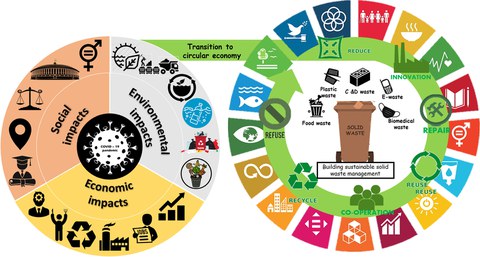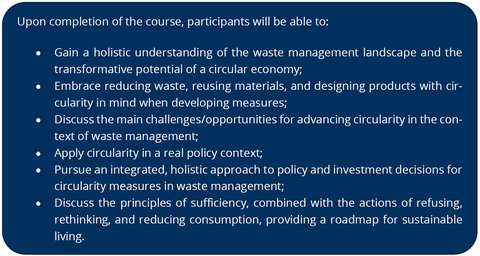91st UNEP/UNESCO/BMUV International Short Course - Circular Solutions for Sustainable Waste Management (SC91)
Duration: November 02, 2024 - December 08, 2024 (on-site in Dresden)
Motivation
In today's world, the escalating challenges of waste generation and the triple planetary crisis of global warming, pollution and biodiversity loss have necessitated a fundamental shift in our approach to resource management and a rethinking of our consumption and material production habits. The concepts of waste management and circular economy (Figure 1) have emerged as powerful strategies to address these critical issues and move us towards a more sustainable future. Waste management, traditionally associated with the collection, transportation and disposal of waste, is undergoing a significant transformation. The linear "take, make, dispose" model is giving way to a more holistic approach that includes waste reduction, recycling, recovery, reuse, and a commitment to reducing environmental and societal impacts. This shift recognizes that the linear model is neither environmentally nor economically sustainable, leading to the transgression of six out of nine planetary boundaries, increased pollution, and ultimately worsening climate change and inequality. By moving from a linear to a circular approach to production processes and waste management, we can significantly reduce the environmental footprint of waste and mitigate the environmental, social and health impacts of resource extraction, production and consumption.

Figure 1: How could a green recovery stimulus, driven by circular economy-based solid waste management assist in attaining the intended targets of the UN-SDGs? (Sharma, H. B. et al. 2021, Circular economy approach in solid waste management system to achieve UN-SDGs: Solutions for post-COVID recovery, in: Science of The Total Environment, Vol. 800)
Waste management and the circular economy are not limited to a specific sector or industry, but are principles with universal application. From consumer products and manufacturing to construction and agriculture, the potential for circularity is vast. Businesses, individuals and governments around the world are recognizing the value of these principles and integrating them into their policies and practices to promote sustainability. Thus, in the face of growing environmental challenges, the principles of sufficiency and the associated actions of refusing, rethinking, and reducing consumption have emerged as powerful tools in fostering sustainability. These principles advocate for a mindful and intentional approach to our lifestyles, encouraging individuals and societies to reconsider their patterns of consumption in order to mitigate the impact on the planet.
Course concept and objectives
The short course is designed to provide participants with a holistic understanding and in-depth exploration of the strategies, principles, and practices of waste management and the transformative potential of the circular economy. It covers a wide range of topics:
- Waste generation and disposal
- Sustainable waste management strategies
- Circular economy principles and business models
- Sustainable production and consumption
- Planetary boundaries, doughnut economy and the SDGs
- Theory of change and systemic transformation
- Water-soil-waste nexus
- Assessing the environmental, economic and social impacts of waste management and circular economy practices
- Policies and international agreements and frameworks in promoting a circular economy
- Climate action & Stakeholder engagement
Objectives
With the course-accompanying creation of Post-Training Action Plans (PTAPs), participants prepare themselves to transfer knowledge acquired in the training into their professional action spaces.
Target groups
This course is aimed at experts who prepare and implement political decisions and practical measures in ministries, authorities, local government and non-governmental institutions of developing countries (including emerging economies) working on resource sustainability and efficiency and waste management as well as sustainable societal development.
We expect a high motivation to explore concepts for waste management and circular economy and to work towards implementing them. A first university degree (e.g. BA, BSc) in a related field is essential. Adequate communication skills in the English language and the nomination by the delegating institution for this full-time course are mandatory.
What makes participating in this course transformative?
- Experience of the CIPSEM team in conducting engaging, meaningful trainings considering the challenges in developing countries and emerging economies
- A full-time, 4-weeks learning experience combining classroom sessions, excursions and group work with guided self-study units
- Renowned international and German facilitators
- Boost of motivation through experience sharing and bonding with fellow experts
- Participants become part of a large international network of environmental experts and leaders (more than 2 700 alumni from 145 countries)
- Transfer of the gained knowledge and skills though mentored development of post-training action plans
- Alumni of this course can apply for one of several innovation fellowships supporting the implementation of the post-training action plan with 2000 €
Fellowship opportunities
The program can award 16 fully funded fellowships covering accommodation in comfortable single studio apartments, local public transport, and all tuition fees (including excursions). Also included are round-trip flights from the participant's country of origin to Dresden, insurance, and a contribution of €550 toward living expenses.
Five additional, partial, fellowships can be awarded among those applicants, who are able to contribute transportation to and from Dresden, insurance, and living expenses other than housing. The partial fellowships include housing in comfortable single studio apartments, public transportation, and all tuition fees (including excursions).
For these partial fellowships, also applicants who currently reside in a non-DAC country are eligible, if their origin and (prospective) area of professional engagement is in a DAC country.
Application and participation
Qualified professionals are welcome to apply for this training from February 28 until April 10, 2024 on CIPSEM’s online application portal. The Steering Committee selects 21 (16+5) participants for this course by June 2024. Only selected participants will be informed via email. Successful participants are awarded a Certificate of Proficiency in Circular Solutions for Sustainable Waste Management.
Please note that the duration stated at the beginning corresponds to the financing period. This includes the course period from November 06, 2024 - December 04, 2024 as well as four arrival days before the start of the course and four departure days after the end of the course.
You can access the online application portal via the following link: https://crm.bu.tu-dresden.de/ausschreibung?1&call=CIPSEM2024-SC91.
Before applying, please also have a look at our hints on application, explanations regarding the application portal and answers to frequently asked questions. For information on other courses, please visit https://tud.de/cipsem/upcoming.
| Name | Institution |
|---|---|
| Amin, Ghada | United Nations University, Institute for Integrated Management of Material Fluxes and of Resources (UNU-FLORES) |
| Best, Aaron | Ecologic Institute |
| Bünemann, Agnes | cyclos GmBH |
| Dr. Dechyeva, Daryna | TU Dresden, Faculty of Environmental Sciences, Centre for International Postgraduate Studies of Environmental Management (CIPSEM) |
| Dr. Egermann, Markus | Leibniz Institute of Ecological Urban and Regional Development (IOER) |
| Fischer, Vanessa | PowerShift e.V. |
| Dr. Gallo, Patrícia | TU Dresden, Faculty of Environmental Sciences, Centre for International Postgraduate Studies of Environmental Management (CIPSEM) |
| Gerking, Leonie | TU Dresden, Institute of Waste Management and Circular Economy, Chair of Waste Management and Circular Economy |
| Dr. Görner, Anna | TU Dresden, Faculty of Environmental Sciences, Centre for International Postgraduate Studies of Environmental Management (CIPSEM) |
| Gürtler, Petra | Freelance City Guide |
| Hansen, Jennifer | Donut Berlin e.V. |
| Hempel, Richards | |
| Karavezyris, Vassilios | Federal Ministry for the Environment, Nature Conservation, Nuclear Safety and Consumer Protection (BMUV) |
| Prof. Dr. Krebs, Peter | Tu Dresden, Institute for Urban and Industrial Water Management, Chair of Urban Water Management |
| Prof. Dr. Leipold, Sina | Helmholtz-Zentrum für Umweltforschung - UFZ |
| Dr. Lohmann, Dietmar | House of Congresses for Environment - Construction - Mobility Dresden |
| Dr. Maletz, Roman | TU Dresden, Institute of Waste Management and Circular Economy, Chair of Waste Management and Circular Economy |
| Mardassi, Walim | Environmental consultant in Tunisia |
| Martinelli, Fernanda | Center for Development Research (ZEF), Department of Ecology and Natural Resources Management |
| Nolde, Erwin | Nolde – innovative Wasserkonzepte GmbH |
| Dr. Ponstein, Helena | Consultant and expert in climate protection and sustainable supply chains in companies; Klimaneutraler Wein |
| Prates, Luisa | United Nations University, Institute for Integrated Management of Material Fluxes and of Resources (UNU-FLORES) |
| Dr. Rechlin, Aissa | Ecologic Institut |
| Schmachtel, Dominique | TU Dresden, Fakultät Umweltwissenschaften, Centre for International Postgraduate Studies of Environmental Management (CIPSEM) |
| Schwan, Benjamin | TU Dresden, Institute of Waste Management and Circular Economy, Chair for Waste Management and Circular Economy |
| Witkabel, Philipp | TU Dresden, Institute of Waste Management and Circular Economy, Chair for Waste Management and Circular Economy |
| Dr.-Ing. Zeug, Walther | Helmholtz-Zentrum für Umweltforschung - UFZ |


